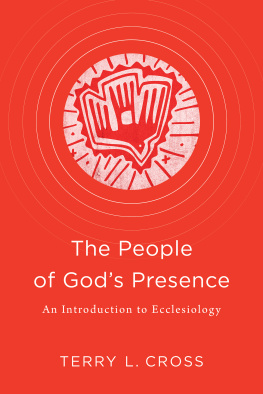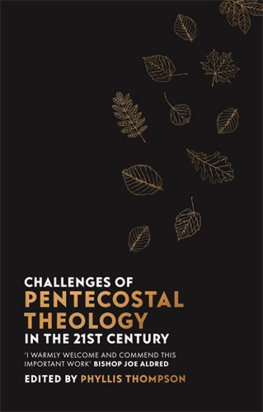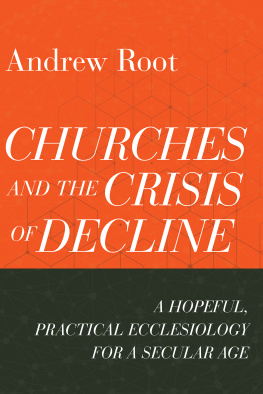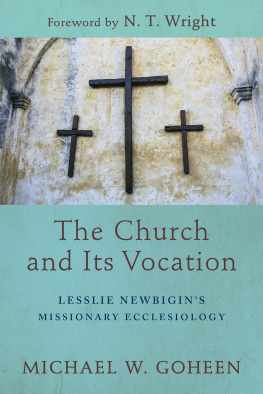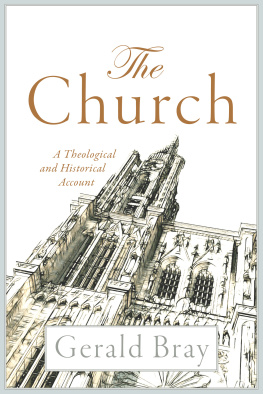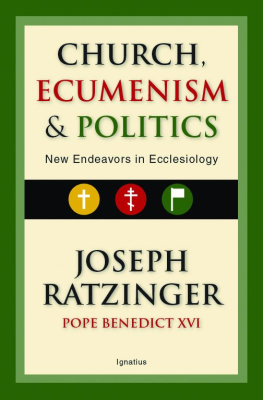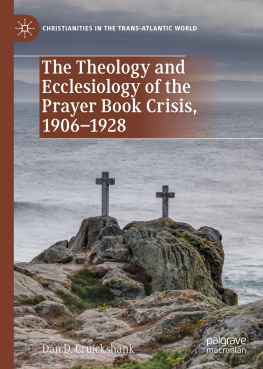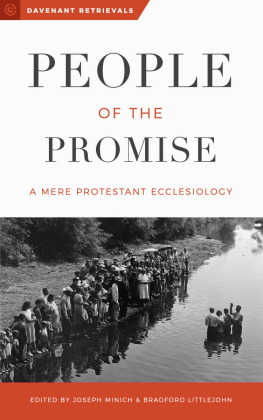Terry L. Cross - The People of Gods Presence: An Introduction to Ecclesiology
Here you can read online Terry L. Cross - The People of Gods Presence: An Introduction to Ecclesiology full text of the book (entire story) in english for free. Download pdf and epub, get meaning, cover and reviews about this ebook. year: 2019, publisher: Baker Publishing Group, genre: Religion. Description of the work, (preface) as well as reviews are available. Best literature library LitArk.com created for fans of good reading and offers a wide selection of genres:
Romance novel
Science fiction
Adventure
Detective
Science
History
Home and family
Prose
Art
Politics
Computer
Non-fiction
Religion
Business
Children
Humor
Choose a favorite category and find really read worthwhile books. Enjoy immersion in the world of imagination, feel the emotions of the characters or learn something new for yourself, make an fascinating discovery.
- Book:The People of Gods Presence: An Introduction to Ecclesiology
- Author:
- Publisher:Baker Publishing Group
- Genre:
- Year:2019
- Rating:4 / 5
- Favourites:Add to favourites
- Your mark:
- 80
- 1
- 2
- 3
- 4
- 5
The People of Gods Presence: An Introduction to Ecclesiology: summary, description and annotation
We offer to read an annotation, description, summary or preface (depends on what the author of the book "The People of Gods Presence: An Introduction to Ecclesiology" wrote himself). If you haven't found the necessary information about the book — write in the comments, we will try to find it.
The People of Gods Presence: An Introduction to Ecclesiology — read online for free the complete book (whole text) full work
Below is the text of the book, divided by pages. System saving the place of the last page read, allows you to conveniently read the book "The People of Gods Presence: An Introduction to Ecclesiology" online for free, without having to search again every time where you left off. Put a bookmark, and you can go to the page where you finished reading at any time.
Font size:
Interval:
Bookmark:
2019 by Terry L. Cross
Published by Baker Academic
a division of Baker Publishing Group
PO Box 6287, Grand Rapids, MI 49516-6287
www.bakeracademic.com
Ebook edition created 2019
All rights reserved. No part of this publication may be reproduced, stored in a retrieval system, or transmitted in any form or by any meansfor example, electronic, photocopy, recordingwithout the prior written permission of the publisher. The only exception is brief quotations in printed reviews.
Library of Congress Cataloging-in-Publication Data is on file at the Library of Congress, Washington, DC.
ISBN 978-1-4934-1796-4
Unless otherwise indicated, Scripture quotations are from the Holy Bible, New International Version. NIV. Copyright 1973, 1978, 1984, 2011 by Biblica, Inc. Used by permission of Zondervan. All rights reserved worldwide. www.zondervan.com. The NIV and New International Version are trademarks registered in the United States Patent and Trademark Office by Biblica, Inc.
Scripture quotations labeled ESV are from The Holy Bible, English Standard Version (ESV), copyright 2001 by Crossway, a publishing ministry of Good News Publishers. Used by permission. All rights reserved. ESV Text Edition: 2016
Scripture quotations labeled KJV are from the King James Version of the Bible.
Scripture quotations labeled NCV are from the New Century Version. Copyright 2005 by Thomas Nelson. Used by permission. All rights reserved.
Scripture quotations labeled NKJV are from the New King James Version. Copyright 1982 by Thomas Nelson. Used by permission. All rights reserved.
Scripture quotations labeled NRSV are from the New Revised Standard Version of the Bible, copyright 1989 National Council of the Churches of Christ in the United States of America. Used by permission. All rights reserved.
To the memory of my grandparents,
who taught me to love Gods presence and Gods people
Rev. Arthur L. Cross (18951984)
Essie Thomas Cross (18921976)
John H. Stockwell (18761943)
Cora Parks Stockwell (18841971)
Cover
Half Title Page
Title Page
Copyright Page
Dedication
Preface
List of Abbreviations
Introduction: A Re-formation of the Church?
1. The Church as the Means of Connecting with God?
2. The Nature of God and the People of God
3. The Encounter between God and Humans
4. The Tasks of the People of God in Gathered Community
5. The Tasks of the People of God in Missional Outreach
6. The People of God Proclaim the Word of God and Hear It Proclaimed
Conclusion: For the Sake of the World
Select Bibliography
Author Index
Scripture Index
Subject Index
Back Cover
This work offers a doctrine of the church for Christians in the twenty-first century. The precise theological location of this ecclesiology will be explained throughout this book and its companion volume, Serving the People of Gods Presence . However, in terms of type or genre, this work is one of constructive theologylike building a house with rooms that are fitting to both ones environment and personal taste. Nonetheless, the theological foundation will be built on Scripture and in particular on the revelation of God in human flesh, Jesus Christ. The style of the house and the features will be informed by those thinkers within the movement of Christianity who have gone before us and blazed a trail of ideas in relation to their times. Constructing a theological house is a rather apt metaphor for the task of this work, but writing a constructive theology of the church that others will read is quite daunting. It is like inviting strangers into ones mental construction to render judgment on the dimensions of each room, the placement of doors and windows, and the adequacy of the decor.
A number of years ago, David Ford expressed rather precisely the sentiment with which I wrote this book: It is riskier to come up with a constructive position, an attempt to design a habitable contemporary dwelling. At every step in the process one is aware of the immense power of the demolition experts with flourishing businesses, of the overcautious insurance and lending companies, of those who protest at ones building going anywhere near their own... , and those who seem quite content that no actual dwellings be built at all if they cannot meet their own impossibly ideal specifications. is an important part of the writing process to be sure, but too much focus on how others will perceive ones theological house can halt construction.
So why am I daring to construct a house that details my understanding of the church? Why not just critique other housessomething with which I am vastly more comfortable? As will be shared in the introduction, I believe that radical shifts are required of the Christian church in this century, the most fundamental of which is a theological renewal of understanding the nature and mission of the church.
Therefore, the reader should understand that my writing is in the form of a proposal, not a set-in-stone system that is always right. Even in my most stringent writing I recognize that I could be wrongthat I may need the engagement of others to help flesh out the reality of the community of faith for our times. Nevertheless, the church seems to be in such a condition today (especially in Western societies) that changing the drapery over the windows is not going to help. What I am proposing is really nothing less than building a new theological house from the foundation up, not rearranging furniture or dressing up our already existing houses with laser light shows and condensed fog to create a sense of mystery that we think will appeal to people.
Perhaps it is important at this point that I share some aspects of my church background so that the reader may better understand some influences for the concepts in this book. My own approach to the doctrine of the church arises from three major arenas: my pastoral experience with three different local churches; my theological and biblical study; and my early years of being shaped by Christians in a small, rural church in Michigan. Trained in systematic theology, I engaged in almost twelve years of pastoral ministry during different segments of my career. Raised as a Pentecostal, I have served classical Pentecostal churches as well as an independent charismatic church. I have been connected with the Church of God (Cleveland, TN) all my life and am currently an ordained bishop in that denomination. However, I have also worked across denominational lines in the ecumenical movement, representing the Society for Pentecostal Studies at the Faith and Order Commission of the National Council of Churches of Christ in the USA for nine years. I am well aware that the proposal in this book will not fit many communions of the Christian faith, but I believe that parts of the proposal may provide a beneficial dialogue partner for them.
My training at Lee College (TN) introduced me to hermeneutical and language skills to begin a lifetime of Scripture study.
Yet it was only as I engaged in the day-to-day task of pastoral work that I began to ask questions of my theological training and of Scripture. From among the conflicting duties demanding my time, how was I supposed to choose which to perform firstif at all? Why did the work of ministry seem to fall entirely on me, the pastor? Should the people of God also be involved in doing the work of ministry? How might that come about? I began to engage in a desperate search to determine what God intended the church to be and do. That search, begun in the throes of pastoral work in the 1990s, has continued over the years as I have shifted from pastoring to teaching theology at Lee University to future pastors, teachers, missionaries, and ministers of Gods work.
Font size:
Interval:
Bookmark:
Similar books «The People of Gods Presence: An Introduction to Ecclesiology»
Look at similar books to The People of Gods Presence: An Introduction to Ecclesiology. We have selected literature similar in name and meaning in the hope of providing readers with more options to find new, interesting, not yet read works.
Discussion, reviews of the book The People of Gods Presence: An Introduction to Ecclesiology and just readers' own opinions. Leave your comments, write what you think about the work, its meaning or the main characters. Specify what exactly you liked and what you didn't like, and why you think so.

